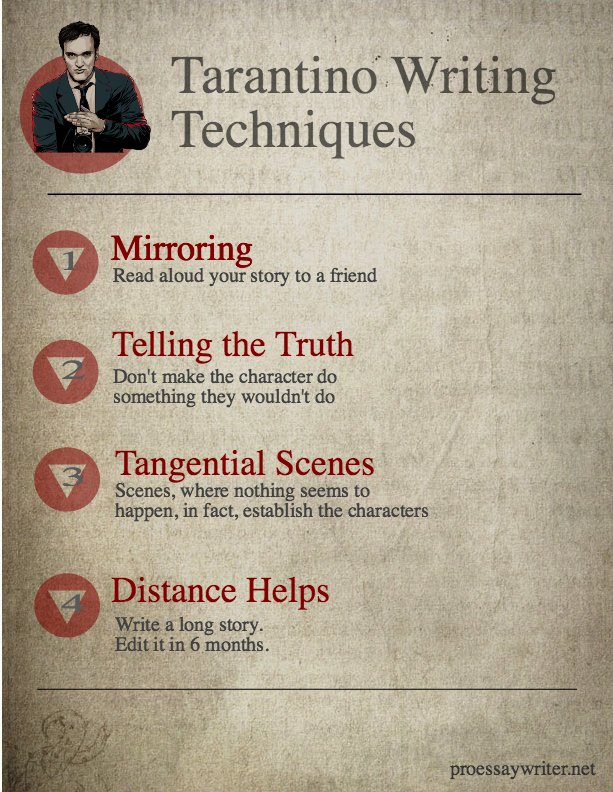
Now when the Hateful Eight is out in theaters, the time is right to see what makes Tarantino stories so spectacular.
Let’s start with the basics: Pulp Fiction was released in 1994. Every Tarantino fan remembers the dialogue between Samuel L. Jackson’s character and John Travolta’s as they drove through the streets of LA on their way to assassinate someone who wronged their boss. The conversation was so cool and casual and so real. In fact, you would never guess what they were heading off to do. Every writer struggling with how to make their own writing real, remembers sitting at the movie theater and thinking, “Oh yes, this is good writing.”
Writing dialogue is one of the things Tarantino is most famous for. That and the blood baths.
So how does he write such incredible scripts? What’s his method? Let’s break it down:
Mirroring
Every artist needs a mirror or a way to see their work through fresh, non subjective eyes. Musicians need to hear their music played back to them. Da Vinci used to look at his artwork in a mirror, literally, so he could see the work from a different perspective and identify areas he wasn’t satisfied with. Dancers can film themselves dancing and watch their performance. Or just dance in front of a mirror. But what about writers? How can they find a “mirror”? In the case of a writer, the best mirror is another person. When Tarantino read his acceptance speech at the Oscar’s for best screenplay in 2013, he thanked the friends who he read his script to.
Many writers send their work to other people and ask for feedback. Tarantino’s method is different. He reads his writing to someone else, and through this process, he can identify what works and what doesn’t, without asking for their feedback. As he said in his speech, “…when I read it to you, I hear it through your ears. And it lets me know if I’m on the right track.”
Tell the truth
In an interview with Erik Bauer after making Jackie Brown, Tarantino revealed many of his writing tactics. Bauer commented on the cleverness of a lot of his scenes and dialogue. Tarantino insisted that it only seems clever because it’s true. If he tries to be clever, it fails. The characters have to be true to themselves. He can’t make a character do something that they wouldn’t do. His advice is not to overanalyze a situation. Just allow the characters to be who they are and that will help you find the story.
Tangential scenes
One of the tell-tale signs of a Tarantino film are the tangential scenes where nothing seems to happen. His dialogues are famously tangential, like the opening scene at the diner of Reservoir Dogs where the topic is an interpretation of Madonna’s “Like a Virgin” and whether or not you should tip the waitress. There is nothing plot-advancing about the scene, but it’s the scene that establishes the characters. Tarantino’s advice is to take your time in the space between the big plot advancing scenes in order to develop the characters. Tangents are just as valid as action.
On a discussion platform about Tarantino’s writing style, Mike Arrow commented that “He has characters act like people. They talk about the minutiae of every day life. TV shows they watched or food they ate. He takes characters that are cliché on the surface- two Hitmen for example- and gives them distinct, relatable personalities. Most films have very learn, stripped down dialogue. All of it plot relevant and businesslike. In Tarantino’s writing, dialogue is rambling, it’s disjointed, but it feels like it comes from real people”
Distance helps you edit
Tarantino tends to write lengthy scripts. The unedited script for Jackie Brown would have been a 6 hour movie. One of the things that helps him to edit is giving himself space from his work. After a month of not looking at the script, he can see where he needs to edit it and the cuts feel natural.
Though Tarantino has many critics, the freshness and originality of his work and the methodical way he builds scenes and characters is the result of an impressive creative mind. Enjoy these tips from the master.
